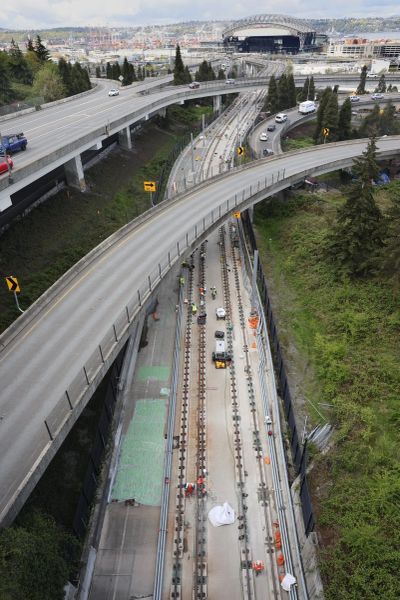Sound Transit will shell out millions to keep pace with construction delays

SEATTLE – A bill of up to $56 million is coming due for Sound Transit’s governing board to keep construction moving on its delayed light-rail corridor between Seattle and Bellevue.
The payments are scheduled for a final vote March 23, but won’t necessarily trigger cost overruns.
To the extent contractor mistakes caused delays, transit officials promise to “aggressively pursue” reimbursement, according to reports Thursday to a transit-board committee, which endorsed the spending increase.
The most severe delays are along the Interstate 90 Lake Washington floating bridge and Mercer Island segments, where Sound Transit disclosed last year that 5,400 flawed concrete rail supports, known as plinths, and loose nylon fasteners must be rebuilt, postponing cross-lake service from mid-2023 until spring 2025.
Sound Transit has hired a forensic engineering firm to investigate, staff said.
Claudia Balducci, chair of the board’s system expansion committee, said during Thursday’s meeting she was worried about handing money to companies to remedy their own workmanship. “I just want to be reassured that we will pursue our rights at the appropriate time to make sure we’re not paying for things we shouldn’t be paying for,” said Balducci, a Metropolitan King County Councilmember from Bellevue.
Also, a section of the future Redmond Technology Station Park-and-Ride garage had to be rebuilt because of cracked crossbeams, a problem the agency announced back in 2020. COVID-19, a slow global supply chain, and a four-month strike by concrete-truck drivers have also been blamed for hindering work across the region.
Mass Electric, which has successfully built signals and operation systems for past Sound Transit lines, would be compensated for lost time, because its teams can’t finish installations until previous construction steps, such as rail-setting and stations, are completed.
Design improvements account for $6 million of Mass Electric’s new $15 million reimbursement, to cover additional pedestrian crosswalk gates; communications and switch heaters that allow trains to change tracks or reverse direction at the future South Bellevue Station; and an added firefighter access door inside the Bellevue downtown tunnel.
Voters authorized the $3.7 billion East Link project in 2008, to transport roughly 45,000 daily riders.
“We are expecting to finish within the budget,” said Jon Lebo, executive project director for East Link. Even after advancing $56 million, about $247 million of available construction money remains unspent, a staff report says.
Lebo said contractors will accelerate to six-day workweeks, 24 hours a day, on the I-90 trackway rebuild.
Meanwhile, the Northgate-Lynnwood line has avoided major interruptions, except the concrete-driver strike, and remains on pace to open in fall 2024 instead of mid-2024, unless the transit board decides a Bellevue-only starter line (not crossing the lake) will open before Lynnwood Link. CEO Julie Timm is looking for ways to open both lines promptly, and overcome the challenge to hire, train, inspect, and do practice runs on two routes simultaneously.
An additional $1.9 million increase, proposed to go to the city of Shoreline, “adds scope” by funding new permit oversight, such as two- to 10 years for the city to monitor wetlands and plants, plus parking and traffic-impact studies after train service to Lynnwood begins.
The additional spending comes on the heels of last week’s critique of Sound Transit from eight experts, presented by former Bay Area Rapid Transit (BART) and Seattle city transportation director Grace Crunican.
They urged the transit board to reduce add-ons to satisfy communities along the route, and to hire three capital-construction leaders from elsewhere who have run multiple megaprojects simultaneously.
Randy Harlow, Sound Transit’s executive director for the $2.7 billion project, said Shoreline “has been a great partner in helping us maintain our permits and maintain our construction schedule.”
Trains to Federal Way, earlier promised by late 2024, are being postponed until 2025, while Sound Transit and contractors re-design and build an elevated trackway through unstable soil in Kent. But the Federal Way project isn’t involved in the payment increases discussed this month; cost negotiations are underway.